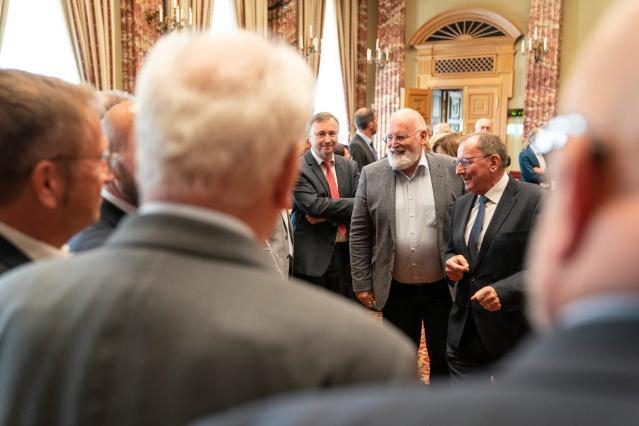
In an exclusive interview with The Guardian, Frans Timmermans, the executive vice-president of the European Commission and its point man on the EU’s green deal, warned of “very, very strong conflict and strife” in Europe this winter if governments can’t guarantee energy supplies. He said Europe will have to make a short-term return to fossil fuels to head off the threat of civil unrest.
Timmermans, the second most senior official in the EU, blamed the tense social situation in Europe and the threat of unrest this winter on Vladimir Putin’s invasion of Ukraine. He said causing social instability was a deliberate strategy on the part of the Russian president and that addressing the social effects of the energy crisis must take precedence over accomplishing the energy transition away from fossil fuels.
“We need to make sure we keep our industry, as much as possible, functioning because the one thing that could help Putin is division in our society,” he told The Guardian.
He also argued that making people suffer this winter in order to stay on track with the energy transition would ultimately be disastrous for solving the ‘climate crisis.’
“I’ve been in politics long enough, over 30 years, to understand that people worry most about the immediate crisis and not about the long-term crisis. And if we don’t address the immediate crisis, we will certainly be off-track with the long-term crisis,” he said.
He said he hoped that by November 1st, at the latest, he would be able to reassure people in the EU that they would have no problem heating their homes this winter.
“Putin is using all the means he has to create strife in our societies, so we have to brace ourselves for a very difficult period,” he said. “If we were just to say no more coal right now, we wouldn’t be very convincing in some of our member states and we would contribute to tensions within our society getting even higher.”
Coal is the ‘dirtiest’ of the fossil fuels, emitting the highest concentration of carbon gases when it burns. Many European countries have shut their domestic coal industries in recent decades, from coal mines to coal burning power plants, in favour of natural gas, which emits less carbon into the atmosphere but almost all of which must be imported. Russia has been the primary source of natural gas for Europe, providing about 40% of its supplies.
To replace Russian natural gas, several European countries have either again fired up their closed coal-power electricity plants or are considering it, importing coal from suppliers outside Europe such as South Africa.
The Guardian also reports that Timmermans gave qualified support for the expansion of fossil fuel exploration in parts of Africa, arousing scepticism in some civil society leaders. He said
In this global situation right now, with the huge shortage of fossil fuel, how can you say to anyone who has fossil fuels: ‘You should not be exploiting that’ … How can we not face the immediate challenge of having to find alternatives for Russian gas and saying to others, ‘You should not be exploiting gas.’ That would be hypocritical. I can’t say that.
Also, according to The Guardian, at the recent G7 meeting, German Chancellor Olaf Scholz insisted that the G7 reverse its refusal to invest in overseas gas projects and to instead assist in the exploration of new fossil fuel fields in developing countries.
Another controversial alternative is nuclear energy. France, in particular, has based its energy strategy on nuclear power and the European Parliament voted this week to class some gas and nuclear power projects as ‘clean’ energy for investment purposes. Belgium has turned course and is keeping its nuclear plants open. Eastern European countries, as well, use and support nuclear energy but other countries, Germany and Spain, for example, have continued to decommission nuclear power plants even as the energy crisis deepens.
Timmermans predicted a global halt in attempts by governments to reduce carbon emissions, but also insisted that a short-term return to fossil fuels was compatible with climate goals, such as limiting global temperature rise to 1.5C ,as set at the Cop26 climate summit in Glasgow last November.
Timmermans again blamed Putin for the present global situation. “Everything hinges on the energy transition, and energy is at the heart of this.
He concluded: “If one of the major energy producers in the world is causing this disruption, as Russia is doing right now, obviously the rest of the world will be edgy in terms of what happens in the energy markets, and obviously that has an implication of can we make further commitments on reducing our emissions given the situation?”
